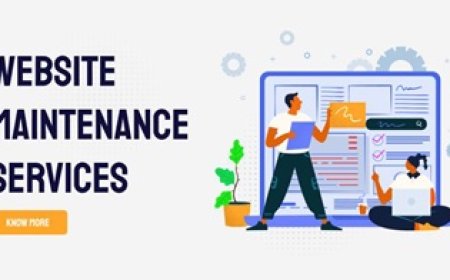Powering Business Growth: The Indispensable Role of Custom Salesforce Development Services
Discover how custom Salesforce development services play a critical role in driving business growth. Learn how tailored CRM solutions enhance workflows, boost productivity, and improve customer engagement.

In today's hyper-competitive and rapidly evolving business landscape, generic solutions rarely cut it. Businesses are constantly seeking an edge, a way to optimize operations, enhance customer relationships, and drive sustainable growth. While Salesforce stands as the undisputed leader in CRM, its out-of-the-box functionalities, while robust, may not always align perfectly with the intricate and unique demands of every organization. This is whereCustom Salesforce Development Services emerge as a true game-changer, transforming the platform from a powerful tool into a bespoke engine tailored to fuel your specific business ambitions.
This blog post will delve into the profound impact of custom Salesforce development, exploring why it's not just a luxury but a strategic imperative for businesses aiming for accelerated growth, efficiency, and a truly competitive advantage in 2025 and beyond.
The Limitations of Off-the-Shelf Salesforce
Salesforce, in its standard form, offers an incredible array of features covering sales, service, marketing, and more. It's a fantastic foundation. However, every business has its own unique workflows, industry-specific regulations, data management needs, and customer interaction nuances. Trying to force your operations to fit a rigid, pre-defined CRM can lead to:
-
Inefficiencies and Manual Workarounds: Processes that could be automated end up requiring manual intervention, wasting valuable time and increasing the risk of errors.
-
Suboptimal User Adoption: If the system doesn't intuitively support your team's existing ways of working, they'll be less likely to embrace it, leading to underutilized features and a poor return on investment.
-
Data Silos and Fragmented Insights: Critical data may reside outside Salesforce or be difficult to connect, preventing a unified 360-degree view of your customers and operations.
-
Lack of Scalability: As your business grows and evolves, an uncustomized system might struggle to adapt, hindering future expansion and innovation.
-
Missed Opportunities: Without tailored functionalities, you might miss out on leveraging specific data points or automating unique customer journeys that could unlock significant growth.
The Transformative Power of Custom Salesforce Development
Custom Salesforce development isn't just about tweaking a few settings; it's about fundamentally reshaping the platform to mirror your business's DNA. It involves leveraging Salesforce's powerful declarative tools (like Flow Builder and Process Builder) and programmatic capabilities (Apex, Visualforce, Lightning Web Components) to build a solution that is uniquely yours. Here's how it empowers business growth:
1. Unlocking Unprecedented Efficiency Through Automation
One of the most significant benefits of custom Salesforce development is the ability to automate complex, repetitive tasks that bog down your teams. Imagine:
-
Automated Lead Routing and Assignment: Leads are automatically assigned to the right sales representatives based on predefined criteria, ensuring rapid follow-up.
-
Streamlined Approval Processes: Complex approvals for discounts, contracts, or new initiatives can be automated, reducing bottlenecks and accelerating deal cycles.
-
Personalized Customer Journeys: Automated email sequences, task creation, and notifications can guide customers through tailored experiences, from onboarding to post-purchase support.
-
Automated Data Entry and Updates: Reduce manual data input errors and ensure data consistency across your system.
By eliminating manual drudgery, your teams are freed up to focus on high-value activities that truly drive revenue and foster customer relationships.
2. Achieving a Unified 360-Degree Customer View
Modern businesses thrive on understanding their customers holistically. Custom Salesforce development facilitates seamless integration with your existing tech stack, breaking down data silos and providing a comprehensive view of every customer interaction. This can include:
-
ERP System Integration: Connecting Salesforce with your Enterprise Resource Planning (ERP) system to synchronize inventory, order history, and financial data.
-
Marketing Automation Platform Integration: Ensuring a smooth flow of lead and customer data between Salesforce and your marketing tools for highly targeted campaigns.
-
E-commerce Platform Integration: Linking online sales data directly to customer profiles for a complete purchase history and personalized recommendations.
-
Third-Party Application Integration: Connecting with specialized tools vital to your operations, from project management software to accounting systems.
This unified view empowers sales, service, and marketing teams with the intelligence they need to deliver personalized experiences, anticipate customer needs, and resolve issues proactively.
3. Tailored Experiences and Hyper-Personalization
In an age where customers expect highly personalized interactions, a one-size-fits-all approach is no longer sufficient. Custom Salesforce development allows you to:
-
Create Custom Objects and Fields: Design specific data structures to capture unique information relevant to your industry and customer segments (e.g., patient medical history in healthcare, property details in real estate).
-
Develop Bespoke Workflows: Design workflows that mirror your exact business processes, ensuring every step of the customer journey is optimized for your offerings.
-
Build Custom Portals and Communities: Provide personalized self-service options for customers and partners, enhancing satisfaction and reducing support load.
-
Craft Dynamic Dashboards and Reports: Gain real-time, actionable insights through dashboards and reports configured to display the metrics most critical to your business objectives.
This level of customization enables you to deliver truly differentiated customer experiences, fostering loyalty and driving repeat business.
4. Scalability and Future-Proofing Your Operations
As your business expands, your CRM system must grow with you, not hold you back. Custom Salesforce development ensures:
-
Flexible Architecture: Custom solutions are designed with scalability in mind, allowing for the seamless addition of new features, modules, and users as your needs evolve.
-
Adaptability to Market Changes: The ability to quickly modify and enhance your Salesforce instance means you can respond agilely to new market demands, regulatory changes, or emerging technologies.
-
Long-Term Relevance: By investing in a customized solution, you are building a future-ready platform that can adapt to unforeseen challenges and opportunities, securing your competitive edge for years to come.
5. Industry-Specific Solutions
While Salesforce offers industry clouds, many businesses still benefit from further tailoring. Custom development allows for the creation of solutions that precisely address the unique requirements of specific sectors:
-
Healthcare: Custom objects for patient records, appointment scheduling, and compliance tracking.
-
Manufacturing: Enhanced inventory management, supply chain integration, and production tracking.
-
Financial Services: Tailored dashboards for portfolio management, compliance adherence, and client onboarding workflows.
-
Retail: Advanced customer segmentation, personalized product recommendations, and loyalty program integration.
These industry-specific customizations ensure that Salesforce truly understands and supports the nuances of your particular business environment.
Best Practices for Successful Custom Salesforce Development in 2025
To maximize the impact of custom Salesforce development, consider these best practices:
-
Clear Requirements Gathering: Before any code is written, a thorough understanding of your business processes, pain points, and desired outcomes is crucial. Engage key stakeholders from all departments.
-
Strategic Planning and Roadmap: Develop a phased approach to customization, prioritizing the most impactful changes first and outlining a long-term roadmap for continuous improvement.
-
Leverage Declarative Tools First: Salesforce offers powerful point-and-click tools (Flow Builder, Process Builder, etc.) that can achieve significant customization without writing a single line of code. Exhaust these options before resorting to custom Apex development.
-
Adherence to Salesforce Best Practices: Follow Salesforce's recommended coding standards, security protocols, and architectural guidelines to ensure a robust, maintainable, and scalable solution. This includes bulkifying Apex code, avoiding SOQL/DML in loops, and comprehensive testing.
-
Focus on User Experience (UX): A customized system is only effective if your users embrace it. Prioritize intuitive interfaces, simplified workflows, and relevant data displays to enhance user adoption.
-
Comprehensive Testing: Rigorous testing (unit tests, integration tests, user acceptance testing) is essential to identify and rectify any bugs or issues before deployment.
-
Continuous Support and Maintenance: Salesforce is an evolving platform. Ongoing maintenance, updates, and strategic enhancements are vital to ensure your custom solution remains optimized and aligned with your evolving business needs.
-
Partner with an Experienced Salesforce Development Company: Choosing a reputable and experienced Salesforce development partner is paramount. Look for a team with certified developers, a proven track record, and a deep understanding of your industry. They can provide invaluable guidance, expertise, and support throughout the entire development lifecycle.
The Future is Custom: Salesforce in 2025 and Beyond
The trajectory of Salesforce development is increasingly focused on deeper customization, driven by advancements in AI, hyper-personalization, and industry-specific solutions. In 2025, we're seeing:
-
Greater AI Integration: Salesforce Einstein will continue to be a cornerstone, enabling more predictive analytics, AI-powered automation, and hyper-personalized customer interactions. Custom development will be key to leveraging these AI capabilities for specific business use cases.
-
Low-Code/No-Code Empowerment: While custom code remains essential for complex functionalities, Salesforce's emphasis on low-code/no-code tools is empowering more administrators and business users to create custom solutions, accelerating development cycles.
-
Enhanced Industry Clouds: Salesforce will continue to refine and expand its industry-specific clouds, but custom development will always be needed to bridge the gap between general industry solutions and a company's unique operational nuances.
-
Data-Driven Decision Making: Custom reporting and analytics will become even more sophisticated, allowing businesses to extract precise, actionable insights from their data for strategic decision-making.
Conclusion:
Custom Salesforce Development Services are no longer a niche offering but a fundamental component of a successful growth strategy. By tailoring Salesforce to your unique business processes, integrating it seamlessly with your existing systems, and focusing on user experience, you can unlock unparalleled levels of efficiency, deliver hyper-personalized customer experiences, and gain a sustainable competitive advantage.
Investing in custom Salesforce development is an investment in your future a commitment to building a scalable, adaptable, and highly optimized platform that will power your business growth for years to come. Choose the right partner, embrace strategic customization, and watch your business thrive.























